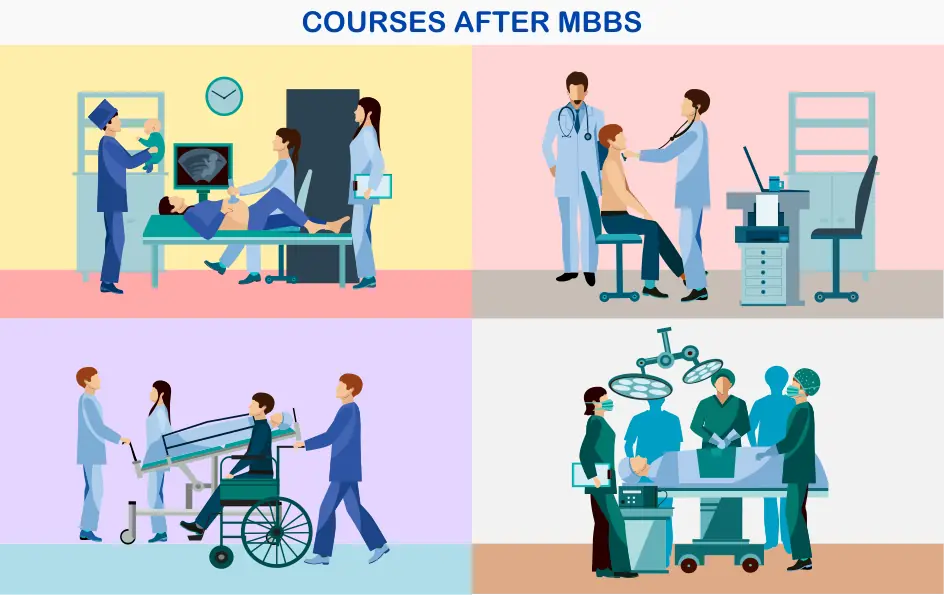What to do after an MBBS degree? A big question for medical professionals after finishing the program After completing their MBBS programs, doctors look at all the possibilities, which can be confusing. That’s why we curated this article to help you find the most significant medical job possibilities, short-term and long-term courses after MBBS.
Medical PG (Postgraduate) education seeks experts who can deliver top-notch medical treatment and contribute to scientific advancement via training and research. A graduate of the MBBS (Bachelor of Medicine and Bachelor of Surgery) program may want to think about pursuing advanced degrees in their areas of interest, such as the Master of Business Administration (MBA), Doctor of Medicine (MD), or Master of Surgery (MS) and many more.
Examining all the PG programs available after MBBS may assist medical students in choosing the profession and career path that best fits their aptitude.
MD/MS Courses after MBBS
Most doctors decide to move on to higher education. A sense of confusion over the area of specialization might exist in a discipline as broad as medicine.
After MBBS, the most popular path selected by those wishing to continue in the medical field is MD and MS. MBBS graduates can choose to specialize in established areas of medicine or emerging ones or can choose from their interests. There is a very good answer by Dr Chirag Bansal on ‘How should I choose a PG branch after MBBS?’
MD Specializations after MBBS
A three-year postgraduate program leads to a doctor of medicine. Here are several MD specializations to consider –
- General Medicine
- Palliative Medicine
- Paediatrics
- Forensic Medicine
- Immunohematology and Blood Transfusion
- Aerospace Medicine
- Community Medicine
- Health Administration
- Anatomy
- Anaesthesiology
- Biochemistry
- Biophysics
- Geriatrics
- Infectious Diseases
- Nuclear Medicine
- Medical Genetics
- Microbiology
- Pathology
- Psychiatry
- Pharmacology
MS Specializations After MBBS
While both degrees are three years long, the field of specialty for a three-year Master of Science (MS) program differs from that of a three-year Doctor of Medicine (MD) program. Focusing on surgical techniques and expert surgical skills may be an option for MS students.
- Obstetrics and Gynaecology
- General Surgery
- ENT
- Ophthalmology
- Traumatology and Surgery
- Orthopedics
MD/MS Eligibility for NEET PG INI CET
The two major entrance exams are conducted nationally to get admission to various MD/MD courses.
INI CET for getting admission in AIIMS and NEET PG will help you to get admission in different state, central government colleges and top private universities
Age Requirements
There are no age restrictions in the NEET PG 2024 application.
Attempt Limit
No maximum number of retakes is permitted for the NEET PG test, according to NBE. Applicants can retake the exam as many as necessary to gain admission to the program or organization of their choice.
Essential Requirements
Candidates must have earned their MBBS degree from an institution recognized by the Medical Council of India (MCI). They must finish a 12-month internship to be eligible to sit for the NEET PG test.
Document of Registration
A current Registration Certificate issued by the Medical Council of India (MCI) or a State Medical Council (SMC) is required of applicants for NEET PG. A copy of this registration certificate must be made available for verification on the exam day. The candidate won’t be allowed to take the test if they can’t provide the Registration Certificate.
DNB Courses after MBBS
- For an MBBS graduate, pursuing their goal of becoming a specialized doctor is the second-best course of action.
- The National Board of Examinations offers the post-graduate degree program known as DNB(Diplomate of National Board), which has MCI approval.
- Even yet, DNB has several drawbacks. First, based on your course and the hospital where you complete your system, the passing rate for DNB is relatively low.
- Second, more MD/MS candidates are given importance than DNB candidates in hospitals.
The three-year course gives information on their chosen industry and the abilities they need to handle emergencies. Students must complete an MBBS degree with at least 50% of the possible points to enroll in this postgraduate diploma program provided by the National Board of Examinations.
DNB Courses After MBBS
Individuals wanting to enroll in DNB courses offered by NBE must qualify NEET PG. The following are the courses available in the postgraduate DNB course:
- DNB (Dermatology and Venereology)
- DNB (Anesthesiology)
- DNB (Obstetrics and Gynaecology)
- DNB (Ophthalmology)
- DNB (Nuclear Medicine)
- DNB (Paediatrics)
- DNB (Orthopaedics)
- DNB (Otorhinolaryngology)
- DNB (Psychiatry)
- DNB (Radiodiagnosis)
- DNB (Pathology)
- DNB (Radiotherapy)
- DNB (Physiatry/Physical Medicine & Rehabilitation)
- DNB (Respiratory Disease)
Make sure there is no peer pressure while selecting specializations. These PG courses will decide your way of life in the future. A thoughtful and informed choice is therefore required in this situation.
DNB Eligibility Requirements:
- DNB has the same eligibility requirements as MD/MS that you can refer to above.
Postgraduate Diploma Course:
A two-year postgraduate diploma program is available after the MBBS. It will be beneficial to gain more knowledge and practical experience. The specialities following MBBS fall into three categories: clinical, non-clinical, and paraclinical. The distinction between them is whether you directly diagnose or treat patients while providing direct care. Clinical positions need direct patient contact, whereas non-clinical roles may occasionally call for patient contact but do not diagnose patients. Additionally, more engagement in inpatient treatment in paraclinical fields must be increased.
- Anesthesia (DA)
- Clinical Pathology (DCP)
- Ophthalmology (DO)
- Pediatrics (DCH
- Gynecology and Obstetrics (DGO)
- Dermatology, Venereology and Leprosy (DDVL)
- ENT (DLO)
- Radio Diagnosis (DMRD)
- Radiotherapy (DMRT)
- Orthopaedics (D Orth)
- Psychiatry (DPM)
- Diabetology ( D Diab)
- Geriatrics (PGDGM)
- Forensic Medicine
- Family Medicine
- Health Education (DHE.)
- Microbiology (D.Micro)
Masters Courses after MBBS
Masters in Medical Science & Technology (MMST)
There is more knowledge available since science and medicine are developing constantly. The following streams also provide a chance to discuss those books and the forthcoming specializations. Masters in Medical Sciences and Technology is another most sought-after post-MBBS degree since it integrates science and technology. This education can further your career and is only available to deserving students at select colleges. The program focuses on healthcare imaging, bioinformatics, and other related topics.
The prerequisite for admission to MMST programs is a Medical Council of India (MCI)-recognized MBBS degree with a minimum cumulative score of 55% and successful completion of mathematics at the 10+2 level (even as an extra subject) or from any accredited Open University.
Public Health
There are two courses available in India: Master of Public Health and Postgraduate Diploma in Public Health, both having a course duration of 2 years. The course is very popular among medical students, and the curriculum is set up to emphasize public health services over research and instruction. In addition to dealing with challenges relating to public health by offering various remedies, such as health awareness programs, the program provides public health maintenance.
Eligibility. The following are the minimum eligibility requirements set by the universities to be eligible for access to the Master of Public Health program:
- Candidates must possess a bachelor’s degree in professional health sciences, such as MBBS, BDS, BPT, nursing, biomedical engineering, or another related discipline.
- Additionally, some colleges and universities require applicants to have a bachelor’s degree with a minimum cumulative GPA of 50% to be considered for admission.
Masters in Health Administration (MHA)
It is a 2-year postgraduate degree program in health administration that MBBS graduates can pursue. The course helps the doctors in administering multi-speciality hospitals and clinics.
The program mainly focus on effective administration and work as top management in a multi-speciality hospital or medical facility. The course will impart knowledge on Marketing and strategic planning, Accounting, Hospital or nursing home administration, Quality management and performance, etc.
Many hospitals have created a demand for doctors with the MHA course in order to enhance their hospital functions and services. There are similar courses provided by different institutes in the name of MBA, and you can look into that as well.
M.Tech in Biomedical Engineering
Following MBBS, doctors can purse MTech in biomedical Engineering. This course is for those who want to pursue the technical side of the medicinal realm. Depending on the university one chooses, this postgraduate degree might last between one and two years. The industry is flooded with opportunities for Biomedical Engineering professionals. It is available in the IITs for students who desire to pursue jobs creating medical devices, developing devices, and making equipment to improve healthcare.
Depending on the institution or institute offering the program, the requirements for admission to the M.Tech. in Biomedical Engineering program may change. But these are the primary becoming eligible requirements:
- A minimum cumulative grade point average (CGPA) of 50% is required for candidates.
- The candidate’s GATE (Graduate Aptitude Test in Engineering) score must be current.
MBA Courses after MBBS
Many professionals who have completed their MBBS also pursue an MBA to manage their team better and deliver the finest services. Following an MBBS degree, MBA programs provide doctors access to other options. People who want to integrate the knowledge gained from an MBA degree with the healthcare industry’s delivery are revolutionizing and improving healthcare. You may enroll in courses for hospital administration and various specialized degrees, including the MBA in Healthcare Management.
| MBA After MBBS Specializations | Duration |
| MBA in Healthcare | 2 years |
| MBA in Hospital Administration and Healthcare Management | 2 years |
| MBA in Healthcare Management | 2 years |
| MBA in Hospital and Healthcare Management | 2 years |
PhD program:
The Ph.D. course combines a significant amount of research with classroom instruction, undergraduate student mentorship, and other components. After MBBS, you can pursue a Ph.D. in the field of your interest. The MBBS graduates can pursue higher studies by opting for a PhD program in research and development offered by various renowned institutes such as the All India Institute of Medical Sciences (AIIMS), National Institute of Mental Health and Neuro Sciences (NIMHANS), and Tata Institute of Fundamental Research (TIFR), Centre for Cellular and Molecular Biology (CCMB), St John’s Research Institute and many more.
In addition to having a qualifying degree, candidates have to pass a national test such as the AIIMS PhD exam, CSIR-UGC NET, ICMR JRF/SRF, DBT JRF/SRF, INSPIRE Fellowship and JGEEBILS. Thereafter, they will be chosen for the Ph.D. programs based on how well they do in the interviews.
Non-clinical and para-clinical Courses After MBBS
Several non-clinical and para-clinical courses are available across many specializations that you may choose from if you’re looking for courses other than clinical PG courses after MBBS. It is a 2 or 3-year MSc course, depending on the college. Following MBBS, some of the popular non-clinical courses for graduate diploma and MSc programs are as follows:
- Pharmacology
- Biochemistry
- Pathology
- Microbiology
- Physiology
- Forensic Medicine
- Anatomy
- Clinical Psychology
- Medical Genetics & Genomic
- Echocardiography
Courses after MBBS without NEET PG and INI CET
Courses are available for MBBS graduates who are not interested in taking NEET PG or INI CET exams. There are opportunities in management, other multidisciplinary employment sectors, research, and several non-medical career courses after MBBS. You can get admission in colleges through merit basis as well. Following MBBS, some well-liked courses but without NEET PG or INI CET include:
- Master of Public Health
- MBA in Hospital Management and Hospital Administration
- MBA in Bioinformatics
- MSc in Computational Biology, Microbiology, Pharmacology, Physiology etc
- MBA/Masters in Pharmaceutical Marketing
- Quality Management and Control
- Medical Administration
- PhD
Jobs After MBBS:
Junior Doctor: After MBBS, you can kickstart your career as a junior doctor in a government hospital or a private hospital. The salary structure will be good, and you will get a permanent job, which is the best option for an MBBS graduate who wants to work.
Private firms: There is always a requirement for MBBS graduates to work in top multinational insurance and analytics firms. You can earn a decent salary by joining as a claims specialist and medical officer, respectively.
Healthcare informatics: If one is strong at statistics, choosing a profession in healthcare informatics would be advisable. In this field, one would mix medical knowledge with analytics and collaborate with a marketing research team for optimal output.
Medical writers: MBBS graduates can work as medical writers for any organization, corporation, or institute involved in the healthcare industry. You will be able to communicate your medical knowledge in a way that will support the mission and vision of the brand you want to build success with.
Conclusion
The employment market is abundant for doctors pursuing courses after MBBS. Their medical expertise and managerial abilities enable them to broaden their horizons and open their practices or clinics. The blend of the latest medical trends and your interest will be the best course you can opt for after MBBS.
We have curated the best article in the field of medical, please check it.




